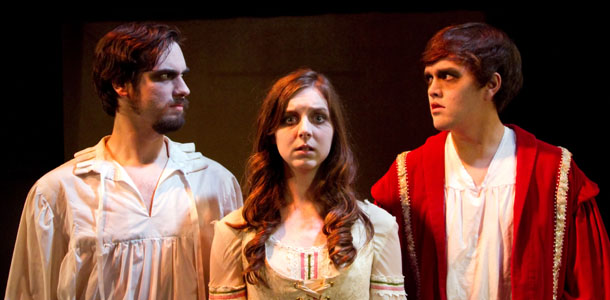Walking into The Empty Space for Bakersfield College’s first production of “Faust” is like walking into an old scary storybook.
Goethes’s “Faust” is an old German legend that has many different versions of the play.
This particular play is scary but humorous, and it sends many messages of morality, religion, and mythology.
The play was focused on Dr. Johann Georg Faust, who was a troubled scholar that was unsatisfied with all his knowledge and wanted more happiness and worldly pleasures.
Faust was so troubled that he wanted to kill himself with poison, but he has some sort of spiritual connection that stops him in the moment of killing himself.
Mephistopheles is a character that was represented as the devil.
Mephistopheles becomes one of the main characters as he makes a deal with Faust to give him happiness.
The deal was Mephistopheles would give Faust happiness if Faust gave his soul to the devil and in return, Mephistopheles would be Faust’s slave.
Faust was debating whether to take the deal or not, but he ultimately sells his soul to the devil because he thinks he can achieve happiness through the devil.
“When Mephistopheles comes in and proposes to be [Faust’s] servant,” he said.
“[Faust] goes for it in the hopes that he would actually gain more from his life,” said Kevin Ganger who played Faust and is one of the directors.
“The really ironic thing is, even with the devil’s help the devil always kind of semi gives him what he wants, but it also ends up failing in the end. He is a very tragic character in that way,” he said.
Mephistopheles was able to give Faust happiness through the lust of a beautiful, innocent, poor maid named Gretchen.
“[Gretchen] is a young woman who is expected to be perfect based on her society and she struggles with temptations just like all of us,” said Jessica Boles who played Gretchen.
Mephistopheles goes through a great deal of trouble to tempt Gretchen with worldly possessions and happiness so it would be easier for Faust and Gretchen to lust for each other.
Once Faust and Gretchen had come together, they went through many tragedies.
Despite all the tragedy throughout the show, there were many humorous parts especially because of the wittiness and charm Mephistopheles has.
The beginning of the show was humorous and it seemed the story would end humorously.
But as the story developed, there was a strong change in the mood with a lot of tragedy, especially in part two of the play where it became serious and sinister.
The uniqueness of the play is not only in the wide variety of moods it goes through, but the uniqueness was also in how the spiritual characters were shown in the play.
“I chose to have the spiritual characters in the style of German expressionism, which is that really tense, expressive faces and bodies and contorting themselves in very strange ways,” said Cody Ganger, one of the directors of the play.


